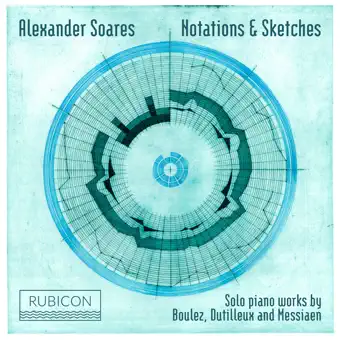mei 2019
Notations & Sketches
Alexander Soares
Voor zijn debuutalbum heeft de Britse pianist Alexander Soares gekozen voor een fascinerend 20e-eeuws programma, met een instinctief begrip van de klankwerelden van de componisten.

Hoewel de meeste van deze stukken zijn verzameld in verschillende bloemlezingen van Franse pianomuziek, kunnen er maar weinig tippen aan deze nieuwe uitgave in zijn evenwichtige conceptie of consistentie van uitvoering. Dit blijkt uit de openingsmaten van Dutilleux' Sonate (1948), de invloeden van Debussy en Ravel gecounterd door die van Bartók en Prokofiev, met name in de finale 'Choral et variations', waarvan de pezige voortgang naar een vastberaden apotheose krachtig wordt weergegeven. De drie Préludes (1973-88) bieden een compendium van Dutilleux' compositietechnieken, met 'Le jeu des contraires' een wedstrijdteststuk dat even nauwgezet als vindingrijk is; terwijl Mini-prélude en éventail (1987) zijn grillige 'hommage' is aan een eeuw van Frans pianospel.
De stukken van Boulez omlijsten op een nette manier de omvang van zijn composities. Notations (1945) is sinds de late publicatie een soort feeststuk geworden. Deze twaalf miniaturen omvatten een scala aan expressies die Soares overbrengt zonder hun samenhang als sequentie uit het oog te verliezen. Une page d’éphéméride (2005) is een ‘gids voor jongeren’ voor modern pianoschrijven, waarvan de afwisseling van harde resonantie en scherp passagewerk Bouleziaans tot in de kern is. Wat de Messiaen-aanbiedingen betreft, zou de onlangs ontdekte La fauvette passerinette (1961) bedoeld kunnen zijn geweest voor een veronderstelde tweede Catalogue d’oiseaux, hoewel de virtuositeit van de evocatie ervan dichter bij de veelzijdige beeldspraak van La fauvette des jardins ligt, bijna tien jaar later, terwijl de Prélude (1964) een gespannen feuille d’album is die als toegift zou moeten worden gevestigd.
Het rondt het recital op boeiende wijze af. Al deze stukken zijn elders verkrijgbaar - de Dutilleux en Boulez in respectievelijke overzichten van Robert Levin (ECM, 8/10) en Marc Ponthus (Bridge, 4/16), en de Messiaen in een boeiende mengelmoes van Peter Hill (Delphian, 12/14) - maar Soares heeft hun maat in overvloed, wat resulteert in wat nauwelijks een veelbelovender debuutalbum had kunnen zijn.

Although most of these pieces have been collated on various anthologies of French piano music, few of them can match this new release in its balanced conception or consistency of execution. This is evident from the opening bars of Dutilleux’s Sonata (1948), its influences of Debussy and Ravel countered by those of Bartók and Prokofiev, most notably in the final ‘Choral et variations’, whose sinewy progress to a resolute apotheosis is powerfully rendered. The three Préludes (1973-88) afford a compendium of Dutilleux’s compositional techniques, with ‘Le jeu des contraires’ a competition test-piece as fastidious as it is resourceful; whereas Mini-prélude en éventail (1987) is his capricious ‘hommage’ to a century of French pianism.
The Boulez pieces neatly frame the extent of his composing. Notations (1945) has become something of a party-piece since its belated publication, these 12 miniatures encompassing a range of expression that Soares conveys without losing sight of their cohesion as a sequence. Une page d’éphéméride (2005) is a ‘young person’s guide’ to modern piano-writing whose alternation of stark resonance and incisive passagework is Boulezian to the core. As to the Messiaen offerings, the recently discovered La fauvette passerinette (1961) may have been intended for a putative second Catalogue d’oiseaux, though the virtuosity of its evocation is closer to the multifaceted imagery of La fauvette des jardins almost a decade on, while the Prélude (1964) is a tensile feuille d’album which ought to become established as an encore.
It rounds off the recital in captivating fashion. All these pieces are available elsewhere – the Dutilleux and Boulez in respective surveys by Robert Levin (ECM, 8/10) and Marc Ponthus (Bridge, 4/16), and the Messiaen within an engrossing miscellany from Peter Hill (Delphian, 12/14) – but Soares has their measure in abundance, resulting in what could hardly be a more auspicious debut album.
